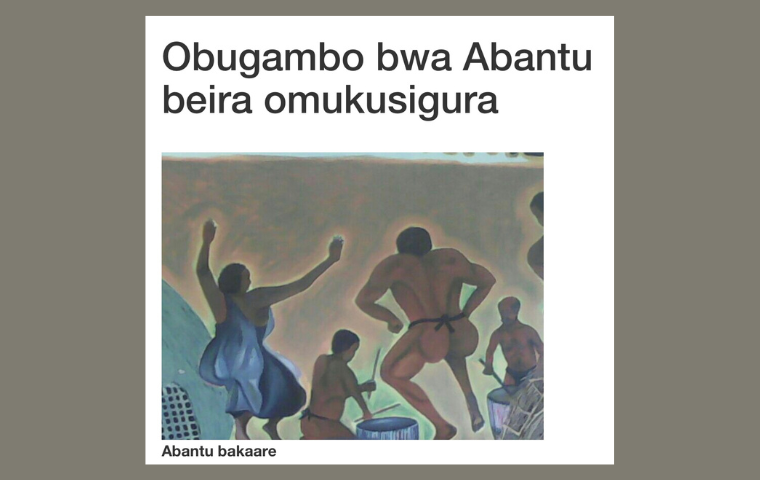(thinking out loud)
Have you ever had a nudging that just could not stop. that feeling of something you just weren’t able to shake. I picture now also in trying to explain this to you, a kind of constant tapping of your foot in a meeting that has gone on too long. a signalling of sorts of urgency. That’s how I would describe asking, and answering this question that starts with who are we; who we have been, and what paths lead us to who we can be.
Perhaps if we begin to let answers unfold to the nitwe baahi, ningashi, turi’barugahi, we can then also respond to the question of, so where we go from here, which grants us room to dream new things for ourselves, and each other.
I ask myself, so where do we go from here because there has to be something else, that is not this, far more than what is being offered by creations of other people’s imaginations. I must ask because not asking means I must accept to fully be swept into this world; a creation of something that was never meant to be mine, or ours. I do not accept.
And so, knowing surely that there are enough of us who cherish our transiency, and defined ever so layeredly by all that we are, and have been, I write on. The answers come through following tracings of what to go back to, knowing that in what we find, we make meaning, even if we are not entirely defined or shaped by it.
The question then of, who we have we been; and who can we be, asks of us to name and know to what are we tethered. To answer, we start from the truth that we are neither the first, nor the only ones. we are only learning, and adding to. things have been here. as such, we are in a shaping of the future, through the ancients. what has been. who we’ve been. who we could be. what we are. We know that we have been made, and because of that, we can learn, even as we teach.
and so, how can this process happen simultaneously, while we are in the experience of this now cultural political economic machinery, that comes layered as it does, with the placings of things and people, how it does. how can we continue to survive and even dream, in-spite of what has been made manifest to us now.
I take a deep breath at this point. (this is why these questions are existential)
You see, tethering, can be defined as; to be, and remain connected to something else.
What, and through whom, we are to define for ourselves, asking as we go along, where we are; where we are going; with whom; and for what. All the while, as stay connected to what follows and comes through after. It is a passive and active way that allows the interdependencies of our lives to take shape. And so, understanding that we are so tethered, our wells run roots deep, and because our wells run so deep, there is much that we can we give, much that can come through us.
This leads me to another set of questions.
because, to be tethered also means that the ropes holding us to what we are connected to, continue to hold, severing of either of the ends holding said ropes, distorts or changes the answers we seek.
so what then, now that things have been so distorted and changed? what do we learn, and through whom?
In Okot b’Bitek’s Song of Lawino, Lawino says to Ocol:
Listen Ocol, my friend,
The ways of your ancestors Are good, Their customs are sold And not hollow They are not thin, not easily breakable They cannot be blown away By the winds Because their roots reach deep into this soil.
I feel both enthralled and peered into by Lawino.
In our classes of Literature, we were always asked to discuss major themes of the books we read. The top one that comes up for Song of Lawino is, “cost of losing one’s self identity”. Lawino’s question is enthralling because it feels both like wanting to satisfy the answer to a feeling that has been nudging at you, with the conflict of now too having to address hard truths that would be easier if you performed as though they were false. These are questions for which after we answer, we are left feeling, tender.
So, enthralled and nudged, I peer into questions, and find myself flooded with more questions, and answers, and curiosities. It is a kind of process of undoing some of who you have been, welcoming in new selves, and mourning the different identity shifts that force a symmetry between the past and the future. I find myself asking, what are the ways of those who have come before, whose names can we call in our times of need, and so on, and so forth.
More questions. and answers. and curiosities.
Some of the answers have come through another thing that I am re-learning. A truth that has always been, which is that we are mere custodians. Transient beings as we are, we carry forward from what has been, nabarijya barya’yongeserezaho, and so forth. There is for example, a thing my people have willed, an oral tradition, if you will that says, “omuri kwata amataka, mutariguza ebyibanjya bya’banyakwenkuruza.”
Why? I have asked. Why dare we not sell the land bequeathed to our grandmothers? The answer has come back, for you do not own. you are simply custodians of. kumuruguza abarijya barazahi. What of those who will come next?
